|
|
|
Sort Order |
|
|
|
Items / Page
|
|
|
|
|
|
|
| Srl | Item |
| 1 |
ID:
152739
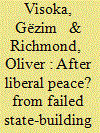

|
|
|
|
|
| Summary/Abstract |
Attempts to build a liberal peace and a concurrent neoliberal state in Kosovo have not managed to produce a sustainable and emancipatory peace. Instead, they have produced a local and negative hybrid peace that has been co-opted by the dynamics of local state formation and state contestation. These dynamics have overshadowed a meaningful transition from ethnic hostility to sustainable peace that should encompass pluralism, security, law, rights, and liberal institutions. This article examines this emergence of a negative hybrid peace and explores the prospects for a more emancipatory peace based on a local pro-peace infrastructure that avoids the pitfalls of liberal peace in practice.
|
|
|
|
|
|
|
|
|
|
|
|
|
|
|
|
| 2 |
ID:
112377
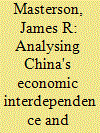

|
|
|
|
|
| Publication |
2012.
|
| Summary/Abstract |
This study examines the effects that economic interdependence has on political relations between China and its neighbours. Three economic liberal hypotheses are tested using data from the International Cooperation and Regional Conflicts dataset to measure dyadic political interaction along with economic data from the IMF and China Statistical Yearbooks and control variable data from Polity IV, COW CINC, among other sources. Though a significant amount of literature addresses the effects trade has on conflict at the systemic level, few studies address it at the dyadic level and even fewer test the pacification of trade on non-Western states. Examining economic, political, institutional, geographical, and political relations data from 1987 to 2001, this research tests the economic liberal hypothesis which posits that interdependence is associated with cooperative political relations between states. The findings show that trade interdependence is generally associated with political cooperation. However, the realist contention that relative power increases are associated with political conflict is also supported and analysed further.
|
|
|
|
|
|
|
|
|
|
|
|
|
|
|
|
| 3 |
ID:
121825
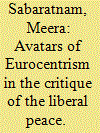

|
|
|
|
|
| Publication |
2013.
|
| Summary/Abstract |
Recent scholarly critiques of the so-called liberal peace raise important political and ethical challenges to practices of postwar intervention in the global South. However, their conceptual and analytic approaches have tended to reproduce rather than challenge the intellectual Eurocentrism underpinning the liberal peace. Eurocentric features of the critiques include the methodological bypassing of target subjects in research, the analytic bypassing of subjects through frameworks of governmentality, the assumed ontological split between the 'liberal' and the 'local', and a nostalgia for the liberal subject and the liberal social contract as alternative bases for politics. These collectively produce a 'paradox of liberalism' that sees the liberal peace as oppressive but also the only true source of emancipation. However, the article suggests that a repoliticization of colonial difference offers an alternative 'decolonizing' approach to critical analysis through repositioning the analytic gaze. Three alternative research strategies for critical analysis are briefly developed.
|
|
|
|
|
|
|
|
|
|
|
|
|
|
|
|
| 4 |
ID:
110307
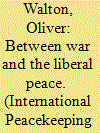

|
|
|
|
|
| Publication |
2012.
|
| Summary/Abstract |
This article explores the interface between international and local approaches to peacebuilding by analysing the experience of two national NGOs involved in peacebuilding work in Sri Lanka between 2006 and 2008. During this transitional period, Sri Lanka's fragile peace process began to unravel. This analysis uses the lens of NGO legitimacy to reflect on the dilemmas and tensions associated with the liberal peacebuilding project and NGOs' role within it. It identifies a critical tension between liberal cosmopolitan and nationalist models of political engagement, which NGOs and the international donors that supported them struggled to negotiate. It argues that NGOs' efforts to reconcile international and local peacebuilding agendas involve uncomfortable trade-offs, and that these processes of negotiation are influenced by NGOs' concerns about organizational survival.
|
|
|
|
|
|
|
|
|
|
|
|
|
|
|
|
| 5 |
ID:
069086
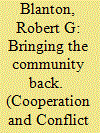

|
|
|
| 6 |
ID:
075357
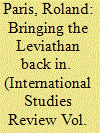

|
|
|
|
|
| Publication |
2006.
|
| Summary/Abstract |
There are crucial differences between classical and contemporary conceptions of the liberal peace thesis, or the proposition that liberally constituted states tend to be more peaceful in domestic affairs, in their relations with other states, or both. Classical liberals such as Locke and Kant believed that peace depended not only on liberal political and economic arrangements but also on a functioning state apparatus, capable of upholding the rule of law and containing societal competition within peaceful bounds. By contrast, modern liberal peace scholars have tended to treat functioning state institutions as a given, focusing instead on the relationship between violent conflict and different types of (already constituted) regimes. As a result, findings from modern scholarship do not necessarily apply to states just emerging from civil wars with damaged, dysfunctional, or nonexistent governmental institutions. Given the abundance of post-conflict peacebuilding operations and failed or failing states in the world today, liberal peace scholars would do well to revisit classical liberalism's dual emphasis on building liberal and effective states as a foundation for peace.
|
|
|
|
|
|
|
|
|
|
|
|
|
|
|
|
| 7 |
ID:
065948
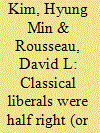

|
|
|
| 8 |
ID:
091972
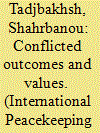

|
|
|
|
|
| Publication |
2009.
|
| Summary/Abstract |
The implementation of liberal peace in the context of both transition economies and post-conflict situations often involves policy advice from international financial institutions for rapid opening of the economic and political systems. Experience, however, shows that the immediate outcome is increased poverty and inequality, leading to high social and human costs. Efficiency-based inquiries on externally supported state building and peacebuilding projects often use a problem solving approach which seeks ways to improve performance without questioning the validity of the liberal peace model. Inquiries based on critical theory, however, question the underlying assumptions and the legitimacy of the project itself. Using evidence from Central Asia and Afghanistan, the article argues that legitimacy depends on both how much, in the eyes of local populations, liberal peace actually improves everyday life, and how much it is valued as a goal and adheres to internal norms and values. The main proposition is that values determine how the liberal peace model is understood, while outcomes impact on how the project is accepted. High expectations of protection and welfare during crises also mean that the state can play a key role as legitimizer.
|
|
|
|
|
|
|
|
|
|
|
|
|
|
|
|
| 9 |
ID:
157532
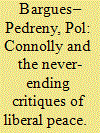

|
|
|
|
|
| Summary/Abstract |
Over the last decade, a dominant critique of international interventions underlines the problem that interventionary strategies have denied the political, societal and cultural heterogeneity of conflict-affected societies, excluding the interests of the majority of their population. A deeper engagement with the everyday life of these societies is understood to expose the errors of international missions and animate an alternative way of thinking about peace: ‘hybrid peace’, which is formed contextually and from below. Engaging with William Connolly’s work on pluralism, this article clarifies the nature of this critique, which rests securely on the assumption that local alterity cannot be fully understood, respected or treated sensitively by international governance approaches. However, as much as this assumption enables the thinking of an emancipatory hybrid peace, it is in turn the source of its critique, as hybrid peace is also seen as reproducing binary schemas and thus considered incapable of caring for the societies intervened in. At the conclusion, the metaphor of vorarephilia—paraphilia where sexual arousal occurs in the idea of being eaten or eating another person—will be used to warn against the tragic direction that critiques seem to be travelling to: critical scholars would be increasingly tempted to welcome the inevitable failures of international interventions.
|
|
|
|
|
|
|
|
|
|
|
|
|
|
|
|
| 10 |
ID:
184968
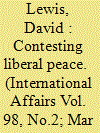

|
|
|
|
|
| Summary/Abstract |
Russia has begun to promote itself internationally as a mediator of conflict and as a ‘peacemaker’. Russian officials cite its extensive experience in managing numerous post-Soviet conflicts and its more recent experience of intervention in civil wars in Syria, Libya, the Central African Republic (CAR) and Nagorno-Karabakh. Russia considers all these activities forms of ‘peacemaking’, but its approach differs radically from the model of liberal peacebuilding that has dominated international practice in the post-Cold War era. It prioritizes authoritarian stability over justice, human rights and democracy and advocates short-term goals of conflict management over long-term goals of conflict resolution. In this article I explain why Russia's norms of peacemaking and conflict management diverged so markedly from liberal peacebuilding norms. I argue that Russia is no longer simply contesting western norms, but developing its own distinct model of conflict management. This model accepts the use of force as an integral element in peacemaking, engages in ‘coercive’ mediation by authoritative actors, and views the West as a geopolitical and normative opponent. This debate over Russia's approach to peace and conflict also offers wider insights into how Russia challenges the norms and practices that underpin the liberal international order.
|
|
|
|
|
|
|
|
|
|
|
|
|
|
|
|
| 11 |
ID:
189007
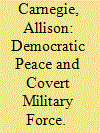

|
|
|
|
|
| Summary/Abstract |
How should we reconcile covert war with normative theories of the democratic peace? Proponents argue that these interventions are consistent with democratic peace theory, as leaders intervene covertly to escape backlash by a public that has internalized liberal norms. Yet we know little about public opinion regarding the covert use of force. Using a survey experiment, we find that respondents are more favorable towards covert interventions against democratic targets than our theories assume, and that even citizens who value transparency the most still wrestle with a trade-off between their normative commitments and the instrumental benefits they perceive covert actions to hold. Our results thus help to explain why American leaders have repeatedly chosen to conduct covert military operations against fellow democracies, and raise important questions about the scope conditions of normative theories of the democratic peace.
|
|
|
|
|
|
|
|
|
|
|
|
|
|
|
|
| 12 |
ID:
160809
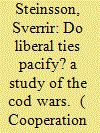

|
|
|
|
|
| Summary/Abstract |
The Cod Wars, three militarized interstate disputes between the UK and Iceland (1958–1961, 1972–1973, 1975–1976), have often been presented as an egregious exception to the liberal peace. There are, however, few comprehensive analyses of the liberal dimensions of the Cod Wars. This article comprehensively analyses the ways in which each of the Cod Wars is consistent or inconsistent with the liberal peace. I find that while the supposedly pacifying factors of the liberal peace – democracy, trade and institutional ties – effectively made the disputes more contentious, they also ensured that escalation to actual war was impossible.
|
|
|
|
|
|
|
|
|
|
|
|
|
|
|
|
| 13 |
ID:
133255
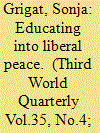

|
|
|
|
|
| Publication |
2014.
|
| Summary/Abstract |
Indonesia has seen excessive political violence in the first years since the end of autocratic rule under former president Suharto. Documented violence has ranged from separatist struggle to communal strife to terrorist attacks. The International Crisis Group (icg) has reported extensively on the conflicts underlying this violence and has formulated policy advice on how to overcome them. While the icg's reports on Indonesia have been acknowledged for their detailed and accurate account of micro-level violence, their recommendations reveal their political objectives. The icg's panacea for overcoming violent conflicts is institution building and security sector reform, which are centrepieces of the 'standard programme' of liberal peace- and state building. However, it is not only its policy advice but all the icg's publications in general that aim to diffuse the liberal governance agenda. This article argues that, through the narrative technique of epideictic oratory, the icg is aiming to educate its audience into a liberal governmentality characterised by practices and procedures which effect a de-politicisation of violence, foster liberal forms of governance and self-government and thus contribute to sustaining liberalism as a global 'regime of power'.
|
|
|
|
|
|
|
|
|
|
|
|
|
|
|
|
| 14 |
ID:
052585
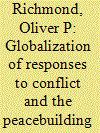

|
|
|
| 15 |
ID:
094588
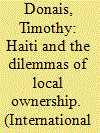

|
|
|
| 16 |
ID:
124153
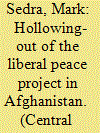

|
|
|
|
|
| Publication |
2013.
|
| Summary/Abstract |
Security sector reform (SSR) has been described as a linch-pin of the liberal state-building and peace-building processes in Afghanistan. The process was originally framed in accordance with the core liberal principles of the SSR model, prioritizing good governance, respect for human rights, sustainability, and democratic civilian control. However, as time passed and security and political conditions began to deteriorate on the ground, the process would gradually revert to a more conventional train-and-equip form, with its core liberal principles stripped away. The slide toward expediency experienced by the SSR process in Afghanistan demonstrates the deeply flawed manner in which the liberal peace project was advanced in Afghanistan. SSR donors became increasingly ambivalent about the human-security objectives of SSR, which were superseded by exigencies of the counterinsurgency, regional security, and domestic pressure for withdrawal. The Afghan experience has raised further doubt about the viability of the orthodox SSR model in conflict-affected countries, already the subject of significant critical debate.
|
|
|
|
|
|
|
|
|
|
|
|
|
|
|
|
| 17 |
ID:
170263
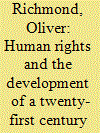

|
|
|
|
|
| Summary/Abstract |
The ‘long peace’ of the last twenty-five years has linked various forms of intervention—from development to peacebuilding and humanitarian intervention—with human rights. This ‘interventionary system/order’ model has premised its legitimate authority on expanded versions of human rights, connected to liberal frameworks of democracy, rule of law, and capitalism in order to connect peace more closely with justice. Human rights offer a tactical way forward for those interested in conflict resolution, but this has led to unintended consequences. Unless conceptions of rights are continually expanded as new power structures and inequalities are uncovered and challenged, philosophical and material matters of distributive and historical justice will remain.
|
|
|
|
|
|
|
|
|
|
|
|
|
|
|
|
| 18 |
ID:
168863
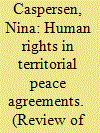

|
|
|
|
|
| Summary/Abstract |
Justice and peace are commonly seen as mutually reinforcing, and key international peacebuilding documents stress the importance of human rights. Is this apparent normative shift reflected in post-Cold War peace agreements? The existing literature is divided on this issue but has crucially treated both conflicts and peace agreements as aggregate categories. This article argues that the conflict type and the agreement's ‘core deal’ impact on the inclusion, or exclusion, of human rights provisions. Based on new coding of the 29 comprehensive agreements signed between 1990 and 2010, it compares agreements signed in territorial and non-territorial conflicts, and agreements with and without territorial autonomy. Qualitative Comparative Analysis is used to examine the different combinations of conditions that led to the inclusion of human rights. The analysis finds that agreements signed in territorial conflicts are significantly less likely to include effective human rights provisions, especially if the settlement includes territorial autonomy. Moreover, such provisions tend to be the result of high levels of international involvement, and the consequent lack of local commitment, or outright resistance, undermines their implementation. These findings point to important trade-offs between group rights and individual rights, and qualifies the notion of a liberal peace.
|
|
|
|
|
|
|
|
|
|
|
|
|
|
|
|
| 19 |
ID:
099567
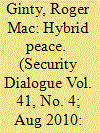

|
|
|
|
|
| Publication |
2010.
|
| Summary/Abstract |
This article is interested in the interface between internationally supported peace operations and local approaches to peace that may draw on traditional, indigenous and customary practice. It argues that peace (and security, development and reconstruction) in societies emerging from violent conflict tends to be a hybrid between the external and the local. The article conceptualizes how this hybrid or composite peace is constructed and maintained. It proposes a four-part conceptual model to help visualize the interplay that leads to hybridized forms of peace. Hybrid peace is the result of the interplay of the following: the compliance powers of liberal peace agents, networks and structures; the incentivizing powers of liberal peace agents, networks and structures; the ability of local actors to resist, ignore or adapt liberal peace interventions; and the ability of local actors, networks and structures to present and maintain alternative forms of peacemaking.
|
|
|
|
|
|
|
|
|
|
|
|
|
|
|
|
| 20 |
ID:
162435
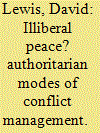

|
|
|
|
|
| Summary/Abstract |
In a contested international order, ideas of liberal peacebuilding are being supplanted by state-centric, authoritarian responses to internal armed conflicts. In this article we suggest that existing research has not yet sufficiently recognised this important shift in conflict management practice. Scholarship in peace and conflict studies has avoided hard cases of ‘illiberal peace’, or categorises them simply as military victories. Drawing on accounts of state responses to conflicts in Russia, Sri Lanka, China, Ethiopia, Rwanda and Turkey, we develop an alternative conceptual framework to understand authoritarian conflict management as a form of wartime and post-conflict order in its own right. Although violence is central to these orders, we argue that they are also dependent on a much wider range of authoritarian policy responses, which we categorise in three major domains: firstly, discourse (state propaganda, information control and knowledge production); secondly, spatial politics (both military and civilian modes of controlling and shaping spaces); and thirdly, political economy (the hierarchical distribution of resources to produce particular political outcomes). In conclusion, we propose a research agenda that moves on from discussions of liberal peace to examine hard cases of contemporary conflict and conflict management.
|
|
|
|
|
|
|
|
|
|
|
|
|
|
|
|
|
|
|
|
|